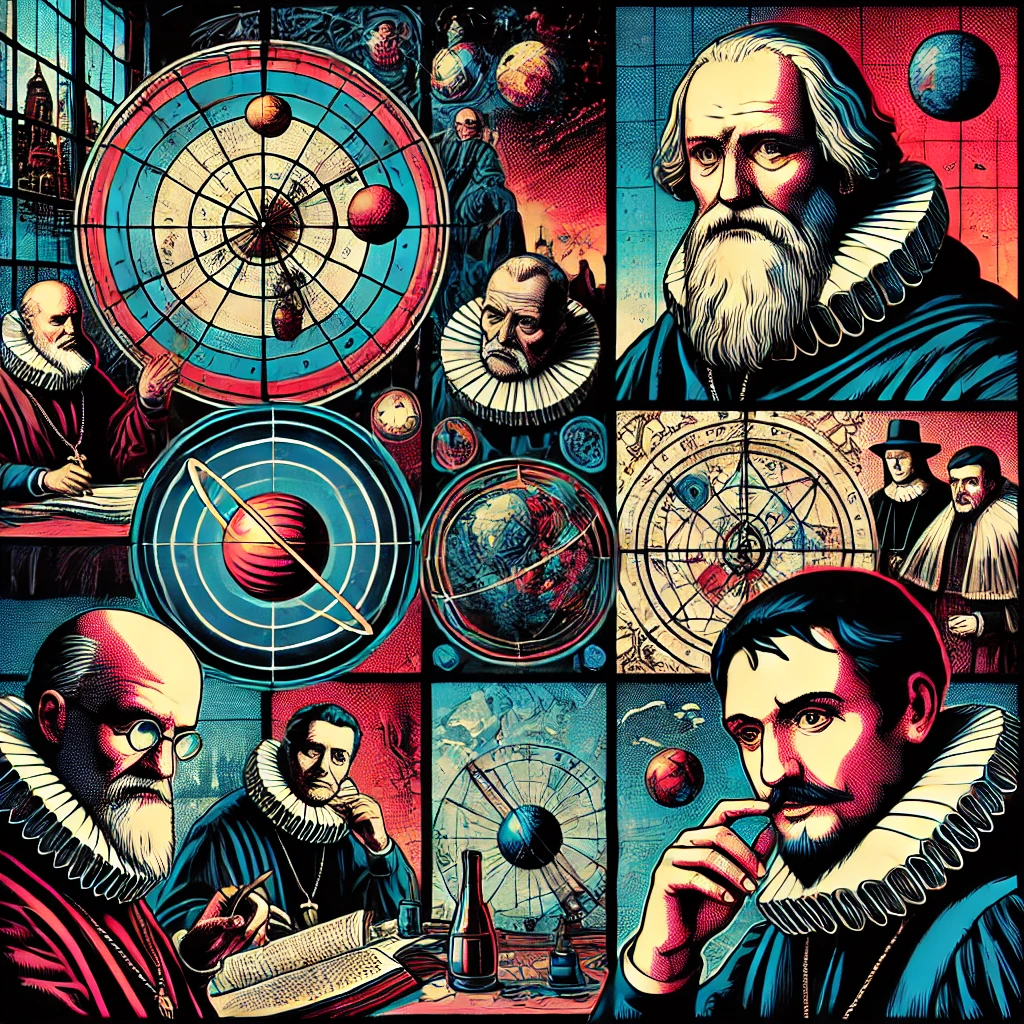Copernicus Kepler Brahe Galileo All Major Big Banger Cosmologists directly connected to Vatican Jesuits
The development of cosmological theories, including the eventual foundations leading to the Big Bang theory, involved contributions from several key historical figures like Copernicus, Kepler, Brahe, and Galileo. Each of these individuals had varying degrees of interaction with the Vatican and, more specifically, with the Jesuit order, which played a significant role in the intellectual life of the time. Here’s an exploration of how each figure was connected:
The development of cosmological theories, including the eventual foundations leading to the Big Bang theory, involved contributions from several key historical figures like Copernicus, Kepler, Brahe, and Galileo. Each of these individuals had varying degrees of interaction with the Vatican and, more specifically, with the Jesuit order, which played a significant role in the intellectual life of the time. Here’s an exploration of how each figure was connected:
1. Nicolaus Copernicus (1473–1543)
- Role in Cosmology: Copernicus proposed the heliocentric model of the universe in his seminal work De revolutionibus orbium coelestium (1543), which placed the Sun at the center of the universe rather than the Earth.
- Connection to the Vatican and Jesuits:
- Education and Church Ties: Copernicus was a canon of the Catholic Church and studied at the University of Bologna, where he learned astronomy under Domenico Maria Novara. The Church supported academic endeavors at this time, including the study of astronomy.
- Jesuits: While the Jesuit order was officially established in 1540, near the end of Copernicus’s life, their later astronomical work, especially at the Roman College, heavily drew on Copernican principles. Jesuit astronomers like Christopher Clavius later became key defenders of a modified geocentric system that incorporated Copernican ideas.
- Vatican Support: Despite initial resistance to heliocentrism, Copernicus’s work was initially well-received, with Cardinal Schönberg even urging him to publish it.
2. Johannes Kepler (1571–1630)
- Role in Cosmology: Kepler developed the laws of planetary motion, which described the elliptical orbits of planets around the Sun, further supporting the Copernican system.
- Connection to the Vatican and Jesuits:
- Jesuit Education: Kepler studied at the Protestant University of Tübingen but corresponded extensively with Jesuit astronomers, who were some of the most advanced scientific thinkers of the era.
- Jesuit Astronomers: Kepler had significant interactions with Jesuits like Paul Guldin and Christopher Clavius. Jesuits supported Kepler’s work in calendars and ephemerides (tables for astronomical observations).
- Conflict and Collaboration: While Kepler was a Protestant, Jesuits respected his scientific contributions. His correspondence with Jesuits showcases mutual intellectual exchange, despite differing religious perspectives.
3. Tycho Brahe (1546–1601)
- Role in Cosmology: Brahe provided precise astronomical observations, which were critical for Kepler’s development of his laws of planetary motion.
- Connection to the Vatican and Jesuits:
- Influence of Jesuits: Although Brahe was not directly associated with the Jesuits, his meticulous observational data became foundational for Jesuit astronomers like Christoph Grienberger and Giovanni Battista Riccioli, who later contributed to refining geocentric and heliocentric debates.
- Funding and Collaboration: The Catholic King of Denmark supported Brahe’s observatory, and while Brahe’s model of the cosmos was geocentric, his data was pivotal for Jesuits engaging in the scientific revolution.
4. Galileo Galilei (1564–1642)
- Role in Cosmology: Galileo’s telescopic observations, including the discovery of Jupiter’s moons and the phases of Venus, provided direct evidence supporting the Copernican model.
- Connection to the Vatican and Jesuits:
- Jesuit Education: Galileo was deeply influenced by Jesuit scientists. He interacted with Jesuit mathematicians like Christoph Clavius, who initially welcomed his discoveries.
- Tensions with the Church: Galileo’s Dialogue Concerning the Two Chief World Systems (1632) led to his trial by the Inquisition, where he was accused of promoting heliocentrism as fact rather than hypothesis. However, Jesuits like Clavius and Riccioli played a role in assessing his work scientifically.
- Jesuit Contributions: The Jesuits maintained a delicate balance, defending scientific rigor while upholding Church doctrine. Galileo’s interactions with them illustrate the tension between advancing science and navigating ecclesiastical politics.
Jesuit Influence on Cosmology
- Role of the Jesuits: The Jesuits were central to the dissemination of Copernican ideas, albeit often modified to align with Church doctrine. Their schools and observatories were among the most advanced in Europe.
- Jesuit Astronomers:
- Christopher Clavius: A leading Jesuit astronomer who revised the Gregorian calendar and promoted astronomy within the Catholic framework.
- Giovanni Battista Riccioli: A Jesuit who proposed a geocentric model incorporating many Copernican elements and contributed to mapping the Moon.
Contributions Leading to the Big Bang
- Foundation for Modern Cosmology:
- The Big Bang theory emerged centuries later but relied on the groundwork laid by these early astronomers.
- Georges Lemaître, a Jesuit-educated Belgian priest and physicist, was the first to propose the Big Bang as the origin of the universe, illustrating the Jesuits’ continued influence in scientific thought.
In summary, Copernicus, Kepler, Brahe, and Galileo were deeply interconnected with the Vatican and the Jesuits through education, collaboration, and intellectual exchange, despite the conflicts and religious divides of their times. This relationship highlights the complex interplay between science, religion, and power in shaping our understanding of the cosmos.
FACT: Vatican Jesuits were literally created to “counter” the Protestant Reformation, to undermine it in all ways and destroy its anti-Catholic essence.
QUESTION: Given that “countering” likely includes undermining via omissions and deceits, how profoundly foolish is it to allow self-sworn enemies of largely Protestant America to keep charge of “higher” education and indirectly control all major societal aspects?
